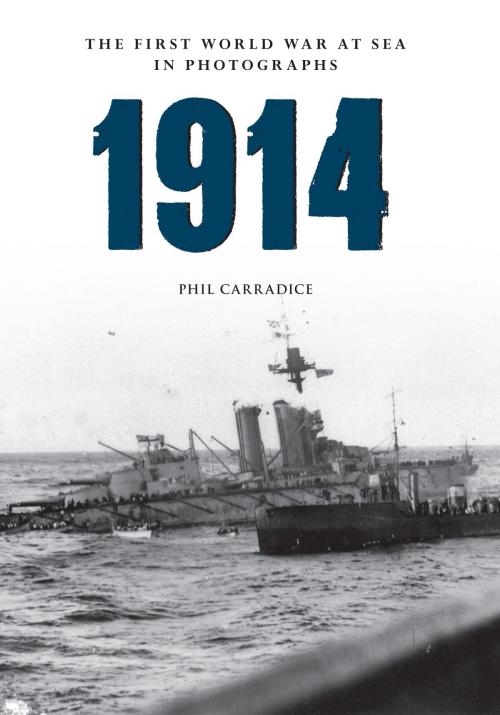1914 The First World War at Sea in photographs
Grand Fleet vs German Navy
Nonfiction, History, Military, Naval, World War I| Author: | Phil Carradice | ISBN: | 9781445622569 |
| Publisher: | Amberley Publishing | Publication: | May 15, 2014 |
| Imprint: | Amberley Publishing | Language: | English |
| Author: | Phil Carradice |
| ISBN: | 9781445622569 |
| Publisher: | Amberley Publishing |
| Publication: | May 15, 2014 |
| Imprint: | Amberley Publishing |
| Language: | English |
The arms race that led to the First World War started in 1897 at the Spithead Naval Review, when Kaiser Wilhelm saw the might of Britain's Navy. He wanted to equal or better the fleet of Britain, and set about a huge building programme of warships. By 1914, tensions in Europe were at a breaking point and, in August, erupted into what would become the first truly global conflict. From almost the first day of the war, as merchant ships scuttled to safe havens, the war at sea saw ship against ship and submarine against ship. Hastily converted merchantmen became auxiliary cruisers, fitted with guns and ready for action. August saw the loss of the Kaiser Wilhelm der Grosse, one of Germany's crack ocean liners, off the coast of Africa; October, the loss of Britain's dreadnought battleship HMS Audacious to a mine; and December saw the Battle of the Falklands and a German attack on the coastal towns of Scarborough, Whitby and Hartlepool. Submarines quickly became a menace in the Mediterranean, English Channel and North Sea, slowly beginning to starve Britain into submission. In August, it was thought the war would be over by Christmas; by December everyone knew they were in for a long, hard slog. The naval war would be one of attrition and one that would ultimately lead to the surrender of Germany's navy in 1918.
The arms race that led to the First World War started in 1897 at the Spithead Naval Review, when Kaiser Wilhelm saw the might of Britain's Navy. He wanted to equal or better the fleet of Britain, and set about a huge building programme of warships. By 1914, tensions in Europe were at a breaking point and, in August, erupted into what would become the first truly global conflict. From almost the first day of the war, as merchant ships scuttled to safe havens, the war at sea saw ship against ship and submarine against ship. Hastily converted merchantmen became auxiliary cruisers, fitted with guns and ready for action. August saw the loss of the Kaiser Wilhelm der Grosse, one of Germany's crack ocean liners, off the coast of Africa; October, the loss of Britain's dreadnought battleship HMS Audacious to a mine; and December saw the Battle of the Falklands and a German attack on the coastal towns of Scarborough, Whitby and Hartlepool. Submarines quickly became a menace in the Mediterranean, English Channel and North Sea, slowly beginning to starve Britain into submission. In August, it was thought the war would be over by Christmas; by December everyone knew they were in for a long, hard slog. The naval war would be one of attrition and one that would ultimately lead to the surrender of Germany's navy in 1918.















